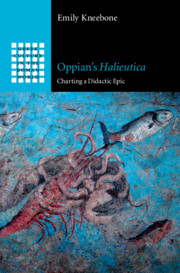Refine search
Actions for selected content:
60732 results in Classical studies (general)
CAR series 1 volume 70 issue 2 Cover and Front matter
-
- Journal:
- The Classical Review / Volume 70 / Issue 2 / October 2020
- Published online by Cambridge University Press:
- 06 October 2020, pp. f1-f8
- Print publication:
- October 2020
-
- Article
-
- You have access
- Export citation
1 - Introduction and Theoretical Framework
-
- Book:
- Aegean Linear Script(s)
- Published online:
- 10 September 2020
- Print publication:
- 01 October 2020, pp 1-41
-
- Chapter
- Export citation

Oppian's Halieutica
- Charting a Didactic Epic
-
- Published online:
- 24 September 2020
- Print publication:
- 08 October 2020
Frontmatter
-
- Book:
- The Undeciphered Signs of Linear B
- Published online:
- 04 September 2020
- Print publication:
- 24 September 2020, pp i-iv
-
- Chapter
- Export citation
Bibliography
-
- Book:
- The Undeciphered Signs of Linear B
- Published online:
- 04 September 2020
- Print publication:
- 24 September 2020, pp 286-327
-
- Chapter
- Export citation
General Index
-
- Book:
- The Undeciphered Signs of Linear B
- Published online:
- 04 September 2020
- Print publication:
- 24 September 2020, pp 345-348
-
- Chapter
- Export citation
Index of Words
-
- Book:
- The Undeciphered Signs of Linear B
- Published online:
- 04 September 2020
- Print publication:
- 24 September 2020, pp 328-334
-
- Chapter
- Export citation
Index of Texts
-
- Book:
- The Undeciphered Signs of Linear B
- Published online:
- 04 September 2020
- Print publication:
- 24 September 2020, pp 335-344
-
- Chapter
- Export citation
Tables
-
- Book:
- The Undeciphered Signs of Linear B
- Published online:
- 04 September 2020
- Print publication:
- 24 September 2020, pp x-x
-
- Chapter
- Export citation
Figures
-
- Book:
- The Undeciphered Signs of Linear B
- Published online:
- 04 September 2020
- Print publication:
- 24 September 2020, pp viii-ix
-
- Chapter
- Export citation
1 - The (Ongoing) Decipherment of Linear B
-
- Book:
- The Undeciphered Signs of Linear B
- Published online:
- 04 September 2020
- Print publication:
- 24 September 2020, pp 1-35
-
- Chapter
- Export citation
5 - Exploring the Potential of Palaeography with the Undeciphered Signs
-
- Book:
- The Undeciphered Signs of Linear B
- Published online:
- 04 September 2020
- Print publication:
- 24 September 2020, pp 175-236
-
- Chapter
- Export citation
3 - The Undeciphered Signs Inherited from Linear A
-
- Book:
- The Undeciphered Signs of Linear B
- Published online:
- 04 September 2020
- Print publication:
- 24 September 2020, pp 96-150
-
- Chapter
- Export citation
Contents
-
- Book:
- The Undeciphered Signs of Linear B
- Published online:
- 04 September 2020
- Print publication:
- 24 September 2020, pp v-vii
-
- Chapter
- Export citation
Appendix - Corpus of Attestations of the Undeciphered Signs
-
- Book:
- The Undeciphered Signs of Linear B
- Published online:
- 04 September 2020
- Print publication:
- 24 September 2020, pp 237-285
-
- Chapter
- Export citation
Conclusions
-
- Book:
- The Undeciphered Signs of Linear B
- Published online:
- 04 September 2020
- Print publication:
- 24 September 2020, pp 237-240
-
- Chapter
- Export citation
Acknowledgements
-
- Book:
- The Undeciphered Signs of Linear B
- Published online:
- 04 September 2020
- Print publication:
- 24 September 2020, pp xi-xii
-
- Chapter
- Export citation
Citations of Texts
-
- Book:
- The Undeciphered Signs of Linear B
- Published online:
- 04 September 2020
- Print publication:
- 24 September 2020, pp xiiii-xiv
-
- Chapter
- Export citation
Transcription Conventions
-
- Book:
- The Undeciphered Signs of Linear B
- Published online:
- 04 September 2020
- Print publication:
- 24 September 2020, pp xv-xv
-
- Chapter
- Export citation
Abbreviations
-
- Book:
- The Undeciphered Signs of Linear B
- Published online:
- 04 September 2020
- Print publication:
- 24 September 2020, pp xvii-xx
-
- Chapter
- Export citation
